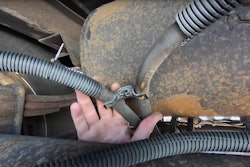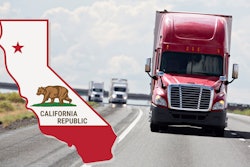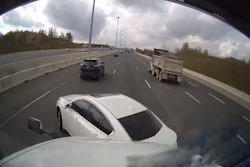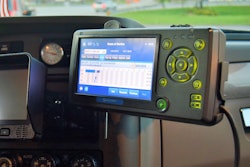A list of petitioners that includes 72-truck reefer carrier Peters Brothers Trucking and 275-truck bulk food grade hauler H.R. Ewell have filed a lawsuit against the state of Pennsylvania and its deployment of emissions standards recently passed in California.
There are more than a dozen so-called CARB states coast-to-coast that historically adopt locally emissions regulations that originate in California. In 2002, the Pennsylvania Environmental Quality Board implemented a regulation that incorporates California’s standards for heavy diesel engines in perpetuity.
Contents of this video
00:00 Rolling diesel regulations02:53 Extended OEM warranty requirements
05:09 Truck dealerships losing business to neighboring states
07:15 Increased business costs to fleets and dealerships
07:26 Stopping the rolling incorporation of California standards
08:32 Adopting laws from other states
Jason Cannon (00:00):
This week's 10-44 is brought to you by Chevron Delo 600 ADF Ultra Low Ash diesel engine oil. It's time to kick some ash.
(00:09):
Pennsylvania Trucking interests have filed a lawsuit to stop the state from implementing emissions regulations that originated in California.
(00:17):
You're watching CCJs 10-44, a weekly webisode that brings you the latest trucking industry news and updates from the editors of CCJ. Don't forget to subscribe and hit the bell for notifications so you'll never miss an installment of 10-44.
(00:31):
Hey everybody, welcome back. I'm Jason Cannon and my co-host on the other side is Matt Cole. California gets a lot of credit for implementing some pretty strict air quality regulations, but the decisions made by California's Air Resources Board have influence across the US. There's more than a dozen so-called carb states coast to coast that historically adopt locally emissions regulations that originate in California.
Matt Cole (00:53):
In 2002, the Pennsylvania Environmental Quality Board implemented a regulation that incorporates California standards for heavy diesel engines in perpetuity. So when California recently adopted new regulations requiring diesel engines to meet more stringent emission standards, those rules automatically became the law in Pennsylvania too.
Jason Cannon (01:12):
Joining the 10-44 this week is Caleb Kruckenberg, one of the Pacific Legal Foundation's attorneys, who's representing a group of trucking industry stakeholders in a case against the state of Pennsylvania and its deployment of carb standards. The list of petitioners include 72 truck reefer carrier, Peters Brothers Trucking, 275 truck bulk food grade hauler, H.R. Ewell, truck dealers, Kenworth of Pennsylvania and TransTech, and the Pennsylvania Motor Truck Association.
Caleb Kruckenberg (01:38):
The lead plaintiff in the case is Peters Brothers, but really we represent a lot of small trucking companies and trucking dealerships in Pennsylvania. And the idea basically is they are the people that are being most affected by the rule that we're challenging. And what's kind of weird is this is an emissions rule that deals with the standards for diesel trucks that have to be sold in Pennsylvania, but it's a California rule, so it's automatically applied in Pennsylvania. And the short version basically is trucks that are sold in PA are more expensive because they have to comply with extra emissions requirements than trucks that are sold across the border and in almost any other state, so in Ohio or West Virginia. And that's why trucking companies and the dealerships both, they're really concerned about it because they have a choice where they can pay for a more expensive truck in Pennsylvania or just drive across the border. Or if you're a dealer, especially a dealer that's close to Ohio as one of our clients is this is a bad situation.
Matt Cole (02:54):
Peters Brothers is particularly at odds with the requirement that OEMs extend warranties up to 600,000 miles depending on model year. The fleet replaces roughly 13 trucks annually and says it would be forced to pay a premium for longer warranties it neither wants, nor needs unless the fleet leaves the state to buy its trucks.
Caleb Kruckenberg (03:11):
If you're a fleet, and I mean, just think about Peters Brothers, which is a small trucking company, it's a family company. They have a relationship with the dealers, and when they need a new truck for their fleet, they have people they go to that they have a good relationship with, they buy their trucks there. Now they have to make a really tough business choice. They can say, I can continue with that relationship. I can continue to support local businesses, buy from the people I know, but I'll have to spend a lot more money for the same truck and buy a warranty I don't want. Or I can do what you said. I can just go across the border. I can start buying my trucks in Ohio and bring them in. But that's not something they want to do. And also, I mean, it is more expensive.
(04:02):
I mean, if you're talking about a fleet, if you're talking about buying 10 new trucks, that's a big undertaking. It's a big undertaking to go out of state, try to buy a truck, service it, all of those sorts of things. And it's really just a question they shouldn't have to answer. They should just be able to buy the trucks that they want to buy. So there's really two costs to the fleets, and one is, you have to buy the more expensive emissions package. But the other is the warranty. And I think there are a lot of fleets that they do in-house service. They don't need a warranty. And I think it's just, it's really kind of presumptuous that they're saying, you know what? You don't even know how to work on your own truck. You don't know how to maintain it, so we're going to make you buy this extended warranty that you don't want. And I just find that kind of offensive. And so I think talking to my clients, that's something that really bothers them and that's part of this rule that we're concerned about.
Jason Cannon (05:09):
On the other end, we have truck dealers who Caleb says, stand to lose a lot of business to neighboring states who don't have to sell trucks with upcharges for the extended warranty coverage.
Caleb Kruckenberg (05:18):
Anywhere close to Ohio and you sell trucks, you are in trouble because you know that you're going to lose business because of this rule because your trucks are going to be more expensive. That's bottom line. And that is a real problem, and that is a real almost existential threat to some of those companies. But it hurts truckers too. It hurts fleets. And it's one of those situations I think where it's a rule that imposes a lot of significant costs on everybody. And it's not one that we have any say in.
Matt Cole (05:56):
The increased business costs to fleets and truck dealers is a major driver of the complaint. But Caleb says, at the heart of it all, is something altogether different. He tells us what that is after a word from 10-44 sponsor Chevron lubricants.
Jason Cannon (06:08):
Protecting your diesel engine and its after treatment system has traditionally been a double-edged sword. The same engine oil that is so essential to protecting your engine's internal parts is also responsible for 90% of the ash that is clogging up your DPF and upping your fuel and maintenance costs. Outdated industry thinking still sees a trade-off between engine and emission system protection, and Chevron was tired of it. So they spent a decade of R&D developing a no compromise formulation. Chevron lubricants developed a new ultra low ash diesel engine oil that is specifically designed to combat DPF ash clogging.
(06:41):
Delo 600 ADF with omnimax technology cuts sulfate ash by whopping 60%, which reduces the rate of DPF clogging and extends DPF service life by two and a half times. And just think what you can do with all the MPGs you're going to add from cutting your number of regens. But Delo 600 ADF isn't just about after treatment. It provides complete protection extending drain intervals by preventing oil breakdown. Before you had to choose between protecting your engine or your after treatment system, and now you don't. 600 ADF from Delo with omnimax technology, it's time to kick some ash.
Caleb Kruckenberg (07:16):
Nobody asked us, nobody asked our clients, nobody gave them a chance to say, this is my concern. And instead it just automatically took effect because people in California decided it should.
Jason Cannon (07:27):
The lawsuit seeks judgment, the California's new heavy diesel emission and warranty requirements will have no effect in Pennsylvania and that future similar regulations will be put before the residence of the state.
Caleb Kruckenberg (07:37):
Kind of two things. We want to stop the incorporation of the new California standard. We want to stop those immediate effects. But our interest, I think is a little bit more long term. We want to stop the rolling incorporation of California standards in general. And we're looking for the court to say basically, if you Pennsylvania want to issue emission standards, you have to play by the normal rules. You have to go through an ordinary process and you have to give people in Pennsylvania a chance to participate in that process. And I think that signals a very important position about the need to follow normal legislative rules. And then as you mentioned, there are other states that do this. So I think this is the first lawsuit of this nature, but I don't know that it's going to be the last.
Matt Cole (08:32):
Pennsylvania is just one of more than two handfuls of states that adopt California regulations. But this group is the first to drag the practice into court for this particular set of rules. And Caleb says, confidence is high they will win.
Caleb Kruckenberg (08:45):
We would never file a lawsuit if we didn't think we were going to win. And I'm confident. We filed this because we think we're right and we think this is a bad policy and it's destructive. And I think the court's probably going to agree with us. But the legal issue is actually pretty simple. There's a statute that says that the environmental control board can recommend policy. That's it. And what they did 20 years ago is they issued a rule saying, guess what? Our policy is, we're going to automatically incorporate California's emissions laws. They're mandatory, and if people don't comply with them, they can be sued by us, they can be sued by private parties.
(09:32):
And so there's kind of two arguments there. There's one is that the board never had that authority in the first place. They don't get to set these mandatory policies. And the second is, I mean, look, if they have that power, if that regulation is valid, then there's a real problem with the Pennsylvania Constitution about how you make laws because you don't just outsource it to another state, another regulator somewhere else. And the Pennsylvania constitution has addressed, I mean, there have been cases in Pennsylvania that address certain similar kinds of incorporations of other laws, and we think there's a very strong argument that the Pennsylvania constitution just doesn't allow those.
Jason Cannon (10:15):
That's it for this week's 10-44. If you can read more on ccjdigital.com. While you're there, sign up for our newsletter and stay up to date on the latest in trucking industry news and trends. If you have any questions or feedback, please let us know in the comments below. Don't forget to subscribe and hit the bell for notifications so you can catch us again next week.










